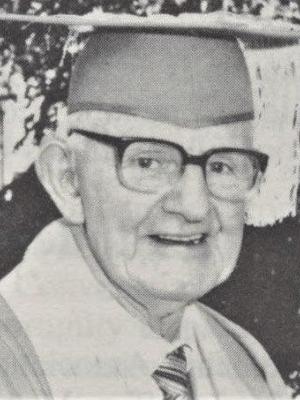Basil Brett was born in Cloncurry, Queensland in November 1922. He attended Prairie State School and All Souls, Charters Towers but his formal education was interrupted by osteomyelitis. Undeterred, "Brah" as he is known to family and friends, undertook a correspondence course from 1938 to 1941 before serving for three and a half years in the Royal Australian Army.
After the War, Brab seized the opportunity for further education. In 1946 he gained a Queensland Junior Certificate and in 1948 was awarded a Queensland Diploma of Agriculture with First Class Honours from the Queensland Agricultural High School and College (now the University of Queensland Gatton College).
He graduated from the University of Queensland with a Bachelor of Agricultural Science in 1953 and gained Second Class Honours in 1956 while working for CSIRO as a Technical Officer and also managing the Agronomy Section of the Pasture Research Station at Samford.
Brah worked as an agricultural officer for Houghton & Byrne P/L and then as Agricultural Chemicals Officer for the Department of Primary Industries in Canberra where he first proposed that chemical residues in Australian beef destined for the U.S.A. market should be monitored.
In 1961 Brah joined the Agricultural Chemical Division of Geigy Australia Pty Ltd and four years later became the first full-time Product, Registration Officer. He represented Geigy on the Agricultural and Veterinary Chemicals Association of Australia (AVCA) spending fifty per cent of his time setting up and running the Association.
During this time he was Chairman of the first AVCA Legislative Committee which by 1968 had 17 active Specialist Committees. The Legislative Committee was a catalyst for converting AVCA to a National Association.
Brah became the prime instigator of submissions to the N.S.W. Poisons Advisory Committee, the Federal Department of Primary Industries and the National
Health and Medical Research Council (NH & MRC) on regulation, classification, labelling and packaging of Agvet chemicals.
He travelled to Britain and Europe to establish liaison with British Agro Chemicals and represented AVCA at the Canadian Agricultural Chemicals International Seminar in 1967 where he put forward Australia's position on chemical legislation.
In 1968 Brab resigned from Geigy and in May 1969 took up the position of Executive Director of AVCA.
Brah held the position of Executive Director and subsequently Director-General for the next eighteen years and was responsible for building the virtually unknown AVCA to the respected position it holds today.
He established working relationships with all Directors-General and senior staff in the Agriculture, Primary Industries and Health Departments at the Federal and State levels.
During this period he held a leading position on many Committees concerned with safety in production, packaging, storage, transport, use, disposal, and Research and Development.

